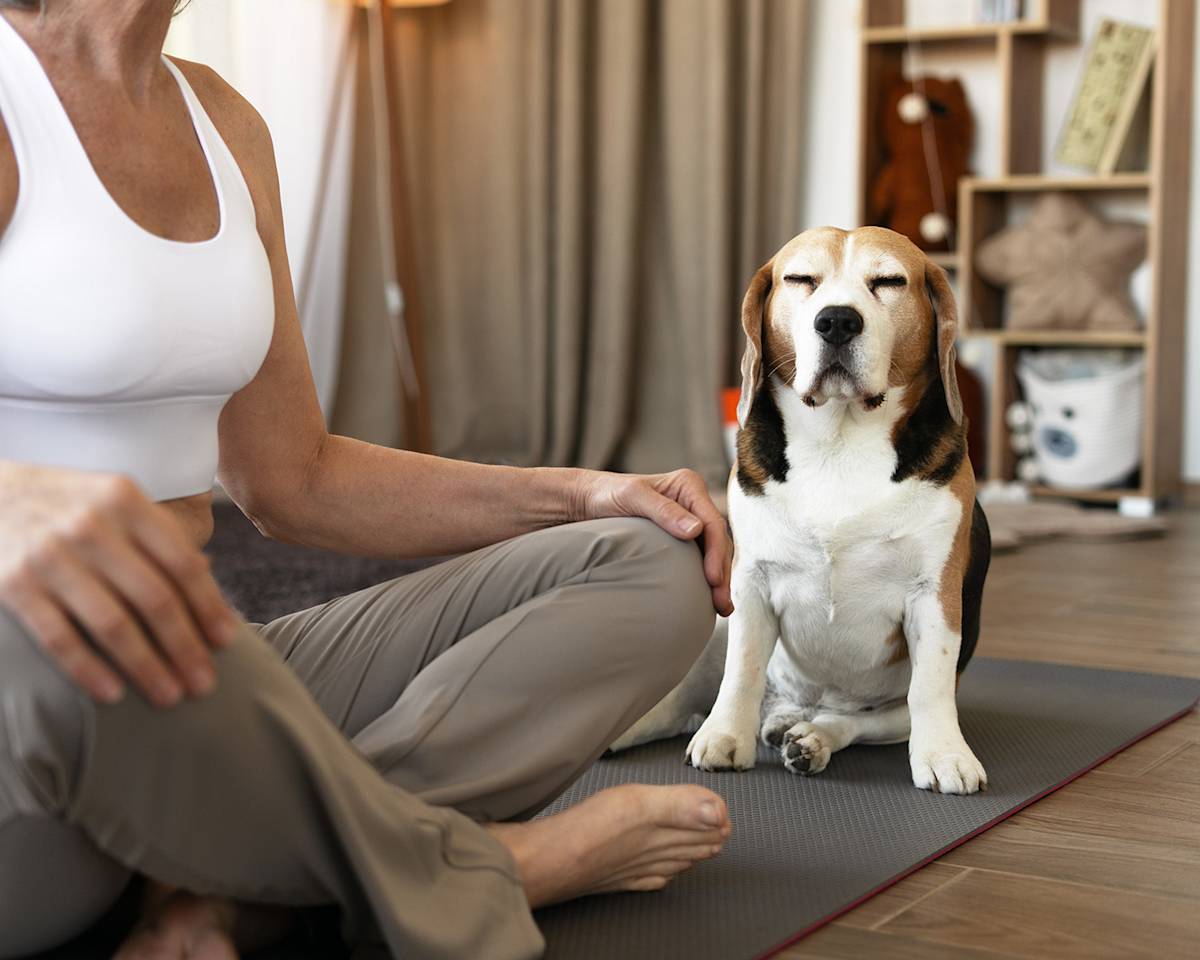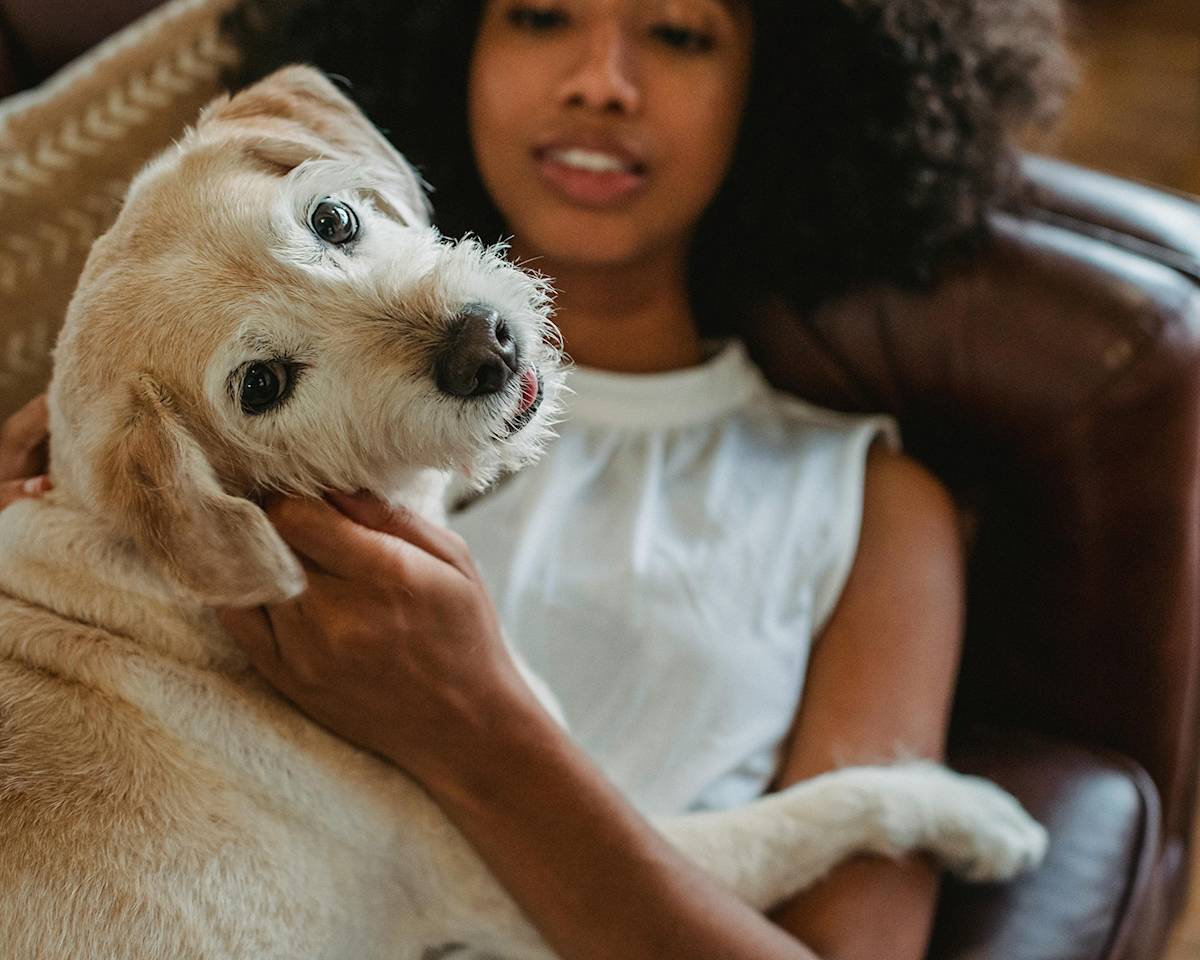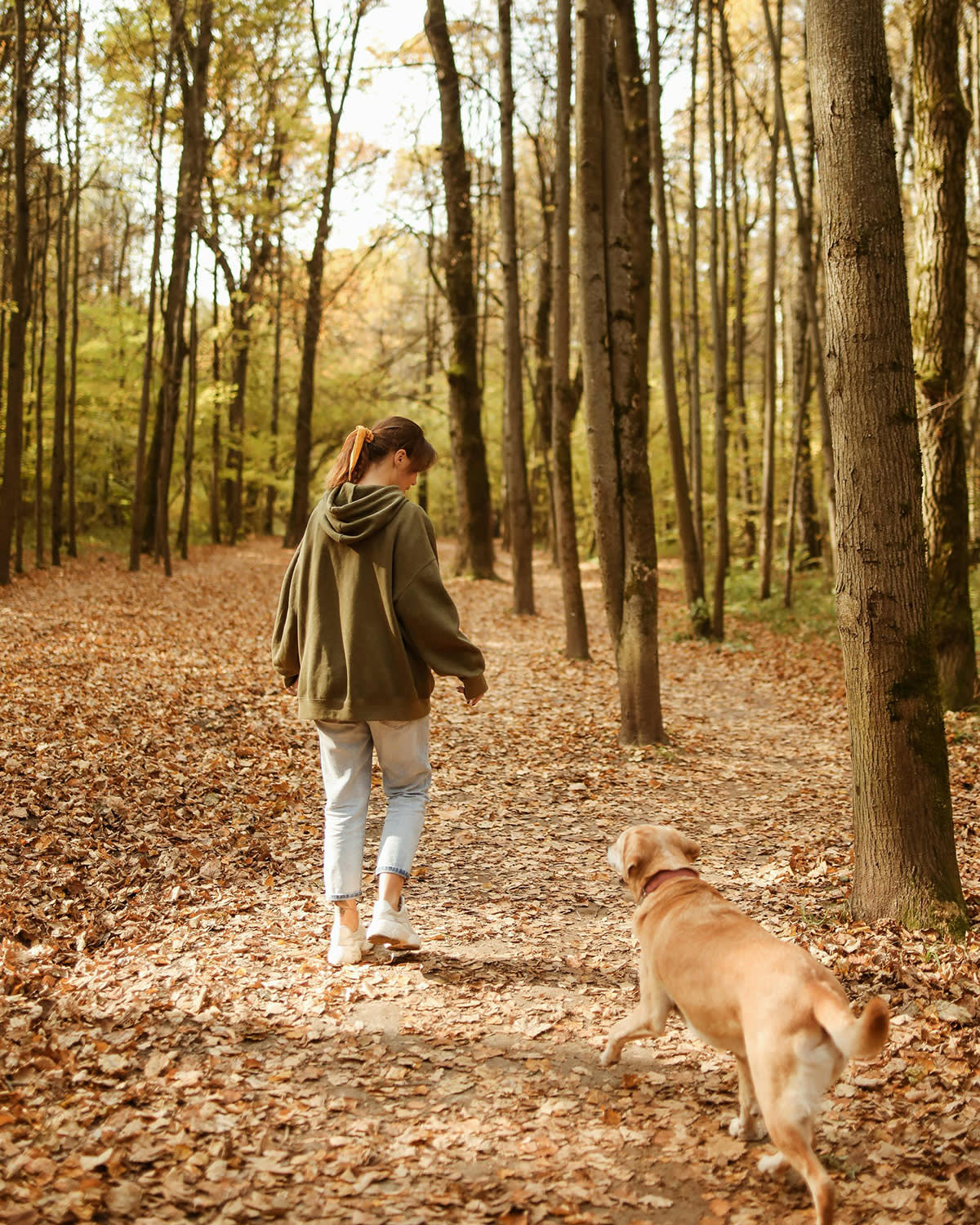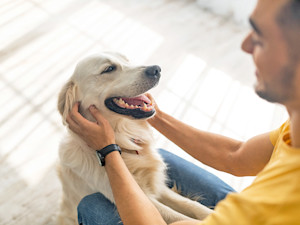
Share Article
We live in a world that constantly tells us to be more mindful. Wake up and go outside before checking your phone. Take regular screen breaks. Walk without distractions. Pause and breathe. Sure, mindfulness coaches and experts (and social media accounts) share this advice daily, but actually living it? That’s a different story.
But when you have a pet in the family, some of these mindfulness practices may be happening without you even realising. When my alarm goes off, I don’t hit snooze or scroll. I get up to let my dog Bobby out. Rain, hail or shine, we’re outside first thing in the morning and again at night, with long walks in between. In the evenings, he nudges my phone away to demand attention, so I put it down and pet him, staring into space. Is that… meditation?

Get (totally free) deals for food, treats, accessories, tech and way more pet parenting must-haves.
Caring for Bobby gives me purpose. It gets me outside, talking to people, noticing the world, and sitting in silence. Without even realising, I’m living all the habits the mindfulness experts talk about.
Could our pets be mindfulness coaches quietly enforcing the habits we struggle to build ourselves? Let’s find out.
Pets as emotional anchors
As much as we might wish our pets could talk, sometimes their silence is their superpower. According to a study from Mars Petcareopens in new tab, the majority of pet parents (84 percent) say their pet’s presence helps them feel more relaxed. It’s a silent, grounding kind of support (no need for words or explanations). In fact, 77 percent of people even find talking to their pet calming.
“Pets offer a listening ear without judgment or agenda,” says psychotherapist and author Eloise Skinneropens in new tab. “Sometimes we just need to offload – to speak our thoughts aloud without advice, interruption or awkward silence. Pets hold space for us in a way many humans can’t. They listen, and they allow us to express ourselves without fear of how we’ll be perceived.”
The emotional comfort goes beyond just their presence. The simple act of stroking a petopens in new tab can release oxytocin, a hormone that helps reduce stress and boost feelings of trust and connection. Daily rituals like feeding, walking and caring for a pet provide structure and purpose, which can ease feelings of loneliness or anxiety.
The power of the ‘paws’
Mindfulness teaches us to pause. To break the cycle of autopilot and be present. But in real life, pausing isn’t always easy. We get stuck in to-do lists, deadlines, spiralling thoughts. That is, until a cat bowl gets pushed towards you or you hear a hopeful bark at the door.
Suddenly, you’re pulled out of your mind and into the moment.
“Pausing is so powerful because it allows us to bring our mind into the present moment,” says Eloise. “It’s one of the main components in practices such as meditation, mindfulness and yoga. When we focus on the present moment, we can often feel a release of tension, stress and anxiety. Instead of worrying about the past or future, we think only about the present.
“Pets can be a great way to bring us back into the present moment, as they often require us to focus on immediate, practical, care-based tasks.”
Whether it’s to fill a bowl, open the door (or window), or go for a walk, these small interruptions are often perfectly timed resets that can break the loop of overthinking.
“Reframing your pet’s daily ‘interruptions’ as loving reminders to pause, breathe and be present can be a powerful wellness tool,” adds Eloise.
Calming the mind
One of the most underrated ways pets support our well-being is by simply helping us get out of our own heads.
In a world full of constant noise, overthinking is second nature. We ruminate over things we said, things we didn’t do and plans we haven’t made yet. But our pets don’t live like that. They’re not stressing about tomorrow’s meeting or last week’s awkward conversation, they’re here now, nudging you to throw the ball or settle into the sofa.
“Pets can also provide an external focus that helps us regain perspective,” says Eloise. “When we’re caught up in cycles or patterns of repetitive thoughts, it can be hard to break them and return our attention to the present moment. Pets often demand our attention be placed on them, which helps us refocus on the things that really matter to us – connection, love, belonging, etc.”
It’s not magic, it’s mindfulness in action. When your animal companion curls up beside you or rests their head on your lap, it’s an invitation to drop the noise and soften your thoughts. Their calm presence helps co-regulate your nervous system, reminding you to breathe deeper, slow down and let go.
The outdoors as therapy
Ask any mindfulness expert, and they’ll tell you: nature is a powerful tool for grounding yourself. But let’s be honest, on a grey, rainy morning, how many of us would willingly go for a walk just for mindfulness?
“We often think we’ll do it later, or we put it off in favour of a different activity,” says Eloise. “Over time, this type of deprioritising can lead to us missing out on the significant wellness benefits of daily outdoor activity, regardless of the weather.”
And yet, if you’ve got a dog? You don’t get a choice.
Dog parents are out in the elements, rain jacket on, powering through the weather. And more often than not, they return feeling more refreshed and recharged than they expected. Nature does its work. And the dog made sure you showed up for it. Plus, dogs are natural icebreakers, leading us into conversation with fellow walkers or neighbours, which usually helps the mind, too.
But it’s not just dog parents benefiting, cats who enjoy outdoor access, rabbits with outdoor hutches, and even birds brought into the garden all encourage their humans to engage more with the natural world. Pets have a way of pulling us out of our routines and into the moment, whether it’s hanging washing with your cat weaving around your ankles, or watching your rabbit explore a grassy patch with quiet curiosity.
Unplug to reconnect
With screens dominating so much of our lives, it’s no surprise that many people feel digitally drained. Pets, however, demand presence. You can’t walk them and scroll TikTok. You can’t play tug-of-war while replying to emails (or maybe you’re a better multitasker than I am). They force you to log off, even just for a moment.
“Switching from our online world to our real offline world can also help us to see the bigger picture,” says Eloise. “Instead of getting caught up in endless content, news and information, we can focus just on what’s in front of us, helping to reduce feelings of overwhelm and exhaustion.”
According to the Mars Petcare study, 77 percent of dog parents say their pet encourages them to take breaks from screens, and for half, it’s a daily reminder to unplug. That small shift is powerful. It reclaims attention, prevents burnout, and lets us reconnect with ourselves, others and the world around us.
Pets as a mindfulness role model
Maybe pets should be our mindfulness role model. Our animals are experts at living in the moment. They appreciate the simple things, such as lying by a warm fire or a tasty treat. They don’t feel foolish playing and enjoy exercising every day in the simplest form. Our pets don’t need screens to keep them entertained, they sleep peacefully and love us unconditionally.
So while mindfulness coaches may give us the theory, maybe our pets are giving us the practice. They ground us in the moment, interrupt our overthinking, get us outdoors, and remind us to rest.

Nuala McHugh
Nuala is a writeropens in new tab with a background in PR. She has worked with brands including Jollyes, Universal Studios, and Amazon. Based in Northern Ireland, she is now doing what she loves most: writing with her clingy cockapoo Bobby by her side.
Related articles
![Valentin Pujadas illustration]()
Pets Are Incredibly Good For Your Mental Health
Experts share the science-backed ways our pets offer us emotional support
![Brown, half breed dog sitting on a chair next to his owner, a blonde stylish woman wearing a brown smart suit.]()
Your Dog Can Read Your Mind, Kind Of
Researchers say dogs actually have a pretty good sense of what we’re thinking
![Man petting a Golden Retriever dog at home.]()
New Global Research Project Will Be the Largest Ever Study on How Pets Impact Mental Health
Mars Petcare is exploring how dogs and cats impact human well-being – and vice versa.
![a dog lies in the sun by a french window]()
5 Ways to Respect Your Dog’s Boundaries (& Not Take Them Personally)
But I thought we were having a moment!





